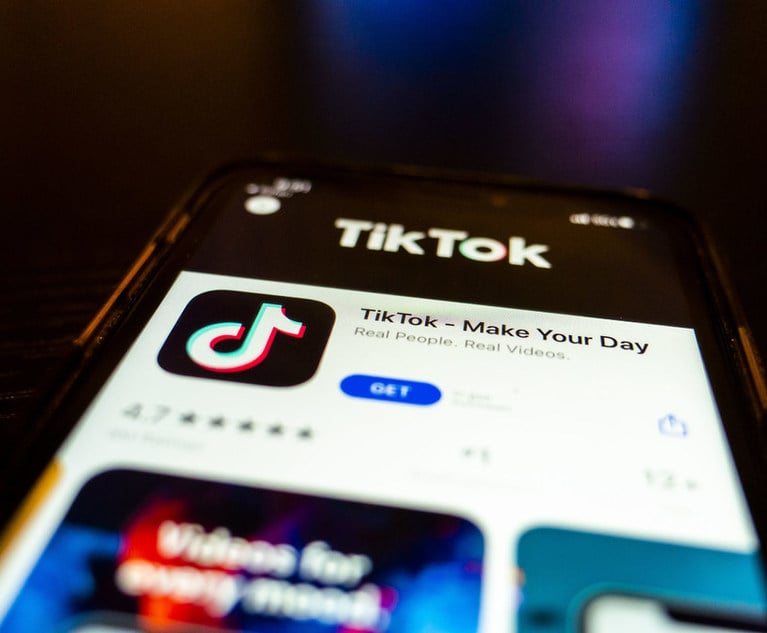Millennial Attorneys and Work-Life: Why 'Blend' May Be Better Than 'Balance'
While not every day will include an equal amount of work and life, the goal is that time and energy spent on work and life will even out over time.
January 25, 2019 at 02:30 PM
6 minute read
 Shilpa Coorg from Winston & Strawn (Courtesy photo)
Shilpa Coorg from Winston & Strawn (Courtesy photo)
A few weeks ago, I received an email likely familiar to many millennial attorneys: a Friday, 8 p.m. communication informing me of an unavoidable work emergency that would require me to scrap some of my weekend plans. It is an email I have received multiple times over the course of my career. Emails such as this have occasionally prompted me to caveat plans I make with friends or family with a disclaimer that my availability is tentative.
It may surprise some that I largely do not mind legitimate and unavoidable interruptions from work to my personal life. Like many others in my generation, I value purposeful work and consider my career growth and development to be a top priority. When a work emergency arises, I often look forward to the opportunities to ensure that clients get what they need and add immediate and cognizable value to a matter, tackle complex issues and think on my feet. Although the work I do may come at the expense of my personal life in that instance, what makes the sacrifice acceptable is the prospect that there will be times in my life when work will not be as active and can take a temporary and relative backseat. In other words, I will be able to achieve a work-life blend.
Millennials enter a workplace culture unlike any other generation. Technology has provided both the possibility and the expectation that employees stay connected throughout the day and every day. The expectation of availability, although pertinent to previous generations as well, may disproportionately affect millennials who may be viewed as needing to “pay their dues” by working hard and being responsive to their managers' and ultimately, clients' needs.
For attorneys, that expectation may be amplified by the realities of legal practice for at least two reasons. First, clients rightfully expect top-notch service from legal service providers, including the ability to react quickly to changing or unexpected situations. This may result in an increased pressure to respond immediately to communications and to generate high-quality or a high volume of work product in a short time frame.
Indeed, some statistics estimate that, by the end of 2015, attorneys were creating or receiving more than 70 documents per day, or 26,000 documents per year. Second, attorneys frequently work long hours, particularly when dealing with large or complex matters that require extra time and attention. There are some suggestions that the billable-hour model could contribute to attorneys needing to stay at the workplace longer or think about work over a longer period of time, depending on personality and work habits.
Recognizing that life as an attorney can be stressful, law firms have attempted to minimize workplace stress in various ways, including allowing for flex-time schedules, adding “stress leave” sabbaticals or turning away from the billable hour as a measure of performance. Some solutions, such as moving away from the billable hour, may not be practical for many legal organizations whose clients appreciate or demand that model. Others may not be effective in achieving the desired result of reducing stress. For example, firms that implemented flex-time schedules sometimes found that being on a reduced hours schedule could have negative reputational or developmental consequences for participating attorneys. In some cases, flex-time attorneys are also susceptible to “schedule creep,” or an unintentional increase in hours to close to a full-time workload without full-time pay.
Another reason these solutions are not always effective may be that they are largely geared to promoting attorney work-life balance, as opposed to blend, which are two similar, but distinct concepts. Work-life balance refers to the ability of an individual to equally split “time and energy between work and other important aspects” of their life, including “family, friends, community participation, spirituality, personal growth, self-care and other personal activities.” In contrast, work-life blend contemplates that, while not every day will include an equal amount of work and life, the time and energy spent on work and life will even out over time.
One metaphor for these concepts is a tub of ice cream containing various ingredients such as chocolate, caramel and cookie dough. Whereas work-life balance would demand equal amounts of ice cream, chocolate, caramel and cookie dough in each bite, blend allows for each bite to have its own makeup, with the understanding that the entirety of the tub will contain an appropriate proportion of all ingredients.
A blend may be more realistic for millennial attorneys who seek satisfaction with a demanding and time-consuming profession, but at the same time, want a fulfilling personal life. Further, for many millennials, work and outside life are intertwined. Millennials value passion as a top priority in their lives, and that includes a desire to obtain personal satisfaction from professional work. Allowing millennials to achieve a work-life blend may also be desirable to legal service providers, who appreciate dedicated and passionate legal professionals who are both engaged and available when needed.
Firms can encourage work-life blend through flexible work policies that allow attorneys to work remotely and to take vacations during downtime. Further, a formalized mentorship program can be a useful resource for junior attorneys who need guidance on blending their professional and personal obligations.
For their part, millennial attorneys can be proactive by seeking mentorship and guidance, establishing reasonable boundaries when necessary and appropriately utilizing flexible work policies offered by employers. Ongoing communication with supervising attorneys and colleagues also smooths the way toward successful blending. Although it remains an ongoing challenge to create a workplace atmosphere conducive both to producing high-quality and timely work product for clients and allowing attorneys to feel engaged and content, embracing a work-life blend may provide steps in the right direction.
Shilpa Coorg is an associate at Winston & Strawn in Los Angeles. She focuses her practice on patent litigation, including pharmaceutical litigation under Hatch-Waxman. She represents and advises industry leaders on intellectual property matters across a broad spectrum of technologies.
This content has been archived. It is available through our partners, LexisNexis® and Bloomberg Law.
To view this content, please continue to their sites.
Not a Lexis Subscriber?
Subscribe Now
Not a Bloomberg Law Subscriber?
Subscribe Now
NOT FOR REPRINT
© 2025 ALM Global, LLC, All Rights Reserved. Request academic re-use from www.copyright.com. All other uses, submit a request to [email protected]. For more information visit Asset & Logo Licensing.
You Might Like
View All
Build It and They Will Come: Tips to Market Your Practice as a Junior Attorney
6 minute read
Yelp Sues Google for Alleged Antitrust Violations, Citing Previous 'Watershed' Government Ruling

There's Something in the Water: San Diego Is Once Again a Hot Market for National Law Firms
6 minute read
What Happens When You Go Viral? How a Law Firm Associate Manages Her Social Media Success
5 minute readTrending Stories
Who Got The Work
J. Brugh Lower of Gibbons has entered an appearance for industrial equipment supplier Devco Corporation in a pending trademark infringement lawsuit. The suit, accusing the defendant of selling knock-off Graco products, was filed Dec. 18 in New Jersey District Court by Rivkin Radler on behalf of Graco Inc. and Graco Minnesota. The case, assigned to U.S. District Judge Zahid N. Quraishi, is 3:24-cv-11294, Graco Inc. et al v. Devco Corporation.
Who Got The Work
Rebecca Maller-Stein and Kent A. Yalowitz of Arnold & Porter Kaye Scholer have entered their appearances for Hanaco Venture Capital and its executives, Lior Prosor and David Frankel, in a pending securities lawsuit. The action, filed on Dec. 24 in New York Southern District Court by Zell, Aron & Co. on behalf of Goldeneye Advisors, accuses the defendants of negligently and fraudulently managing the plaintiff's $1 million investment. The case, assigned to U.S. District Judge Vernon S. Broderick, is 1:24-cv-09918, Goldeneye Advisors, LLC v. Hanaco Venture Capital, Ltd. et al.
Who Got The Work
Attorneys from A&O Shearman has stepped in as defense counsel for Toronto-Dominion Bank and other defendants in a pending securities class action. The suit, filed Dec. 11 in New York Southern District Court by Bleichmar Fonti & Auld, accuses the defendants of concealing the bank's 'pervasive' deficiencies in regards to its compliance with the Bank Secrecy Act and the quality of its anti-money laundering controls. The case, assigned to U.S. District Judge Arun Subramanian, is 1:24-cv-09445, Gonzalez v. The Toronto-Dominion Bank et al.
Who Got The Work
Crown Castle International, a Pennsylvania company providing shared communications infrastructure, has turned to Luke D. Wolf of Gordon Rees Scully Mansukhani to fend off a pending breach-of-contract lawsuit. The court action, filed Nov. 25 in Michigan Eastern District Court by Hooper Hathaway PC on behalf of The Town Residences LLC, accuses Crown Castle of failing to transfer approximately $30,000 in utility payments from T-Mobile in breach of a roof-top lease and assignment agreement. The case, assigned to U.S. District Judge Susan K. Declercq, is 2:24-cv-13131, The Town Residences LLC v. T-Mobile US, Inc. et al.
Who Got The Work
Wilfred P. Coronato and Daniel M. Schwartz of McCarter & English have stepped in as defense counsel to Electrolux Home Products Inc. in a pending product liability lawsuit. The court action, filed Nov. 26 in New York Eastern District Court by Poulos Lopiccolo PC and Nagel Rice LLP on behalf of David Stern, alleges that the defendant's refrigerators’ drawers and shelving repeatedly break and fall apart within months after purchase. The case, assigned to U.S. District Judge Joan M. Azrack, is 2:24-cv-08204, Stern v. Electrolux Home Products, Inc.
Featured Firms
Law Offices of Gary Martin Hays & Associates, P.C.
(470) 294-1674
Law Offices of Mark E. Salomone
(857) 444-6468
Smith & Hassler
(713) 739-1250






